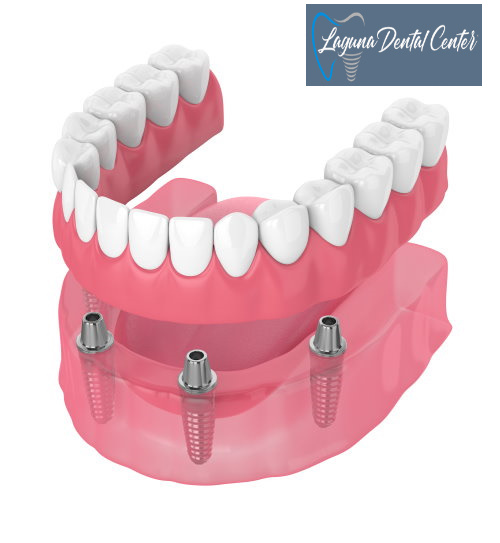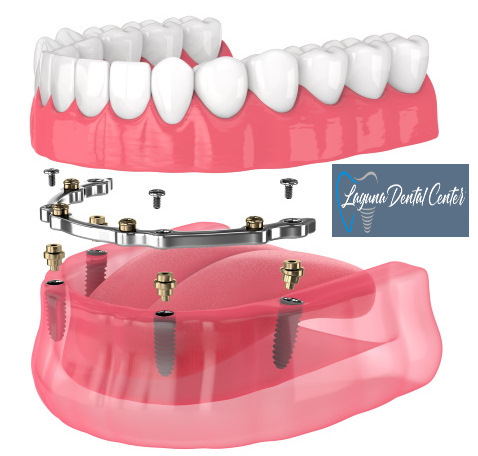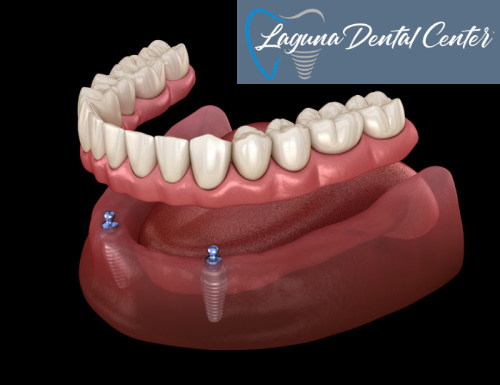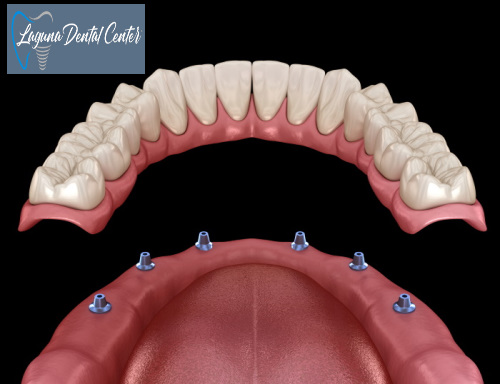Table of Contents
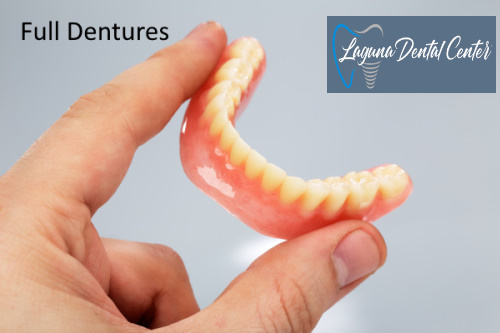
What are Full Dentures?
A prosthetic appliance comprised of acrylic, dental porcelain, or ceramic is a full or complete denture. The complete upper or lower set of lost teeth is replaced with a detachable appliance.
What are the types of Full or Complete Dentures?
There are two types of full dentures: immediate and conventional
Immediate Dentures
Until the moment of converting to conventional dentures, immediate dentures are worn. Following tooth extraction, immediate full dentures are worn to preserve the gums and promote complete healing.
Conventional Dentures
Conventional dentures seem like your natural teeth because they are permanent. Conventional dentures fit you perfectly since they are produced just for you and progressively adapt to your mouth.
What is an Overdenture?
A type of denture supported by dental implants is an overdenture. These dentures click onto attachments of teeth implants rather than attaching to your gums with adhesive, offering better stability than conventional dentures and preserving jawbone density.
Fixed implant-supported overdenture
An implant-supported overdenture that is locked in and cannot be removed is known as a fixed implant-supported overdenture. Although it is the most stable form of overdenture, cleaning it may be difficult because only the dentist can take it out.
Bar-retained implant-supported overdenture
A bar affixed to the implant in a bar-retained implant-supported overdenture allows for the attachment of the denture. This design offers greater security than conventional dentures and enables the denture to clip on and off the implants as necessary.
Ball-retained implant-supported overdenture
A ball-retained implant-supported overdenture is a type of overdenture where the abutment is ball-shaped. A ball-retained design is a great option for the lower arch, where two or four implants are often placed in the jawbone since it gives stability and enhanced functioning over traditional dentures.
How does the Full Dentures Process Work?
Dentures are created just for you; thus, a process is followed to guarantee that yours fit, look, and function perfectly. The following steps are commonly included in the complete dentures procedure.
- A dental examination. The first step in establishing the condition of your teeth and oral health is a dental examination. We will look for any indications of illness, tooth decay, or prior dental work that could impact the fabrication of your dentures throughout the examination. Before attaching the dentures and removing them, we’ll also check for any teeth that could need to be extracted.
- Making dentures. Once it is determined that you are a good candidate for full dentures and that your gums have healed completely, we will take measurements and mold your teeth to guarantee that your dentures fit perfectly. The lab will construct the dentures according to specifications from these measurements.
- Fitting the dentures. You will be contacted to come to our office for a fitting once the dentures are finished. You shouldn’t feel discomfort or have any other problems when you wear it. Then, if required, we make changes to your dentures.
You’ll need some time to become used to using your prosthesis. Once you’ve properly adapted to your dentures, it will ultimately have the same function and control over your teeth. However, you may first experience some difficulties eating and speaking with it.
Make an Appointment with Dr Ronald Ayzin at Laguna Dental Center for Full or Complete Dentures
Call us at (949) 704-6269 to schedule an appointment.
- FREE Full Dentures Consultation ($100 Value)
- FREE Digital X-rays especially for Full Dentures ($150 Value)
- We Maximize your Insurance so you pay less out of pocket.
Contact Us:
How long does it take to get Full Dentures?
It typically takes six weeks to three months, but it might take longer, depending on if you need any teeth pulled, how long it takes for your body to heal, and other reasons. There is no set period for getting complete dentures because each one is individually made to fit the wearer.
What are common problems with Full Dentures?
It might take some time to become acclimated to new dentures, and problems are frequently encountered before they feel secure and at home in your mouth. The most typical issues with complete dentures are listed below.
- Early on in the adjustment period, soreness and discomfort are normal. New dentures can contribute to discomfort by rubbing against your mouth and generating pain and irritation.
- As you adjust to your new dentures, they will feel unusual in your mouth and make it challenging to talk normally.
- Because their mouths are still getting acclimated to the dentures or because their gums are still mending, the majority of patients find it challenging to eat regularly.
- Slipping dentures are frequent, particularly while your mouth is still getting used to them. When speaking or eating during this period, the dentures are likely to fall out.
Am I a Good Candidate for Full Dentures?
People who have lost most of their teeth should consider full or complete dentures. Dentures might not always be the best choice for patients, though. The people who are good candidates for complete dentures are listed below.
- You have healthy gum tissue and jawbone.
- You are not a good candidate for dental implants.
- You have a tooth that is fractured, decaying, or damaged.
- You find it challenging to chew meals.
- You have low self-confidence because of your missing teeth.
For Overdentures, you will also need to have these qualifications.
- You need to be in generally good health.
- You should be in good dental health.
- You should have a sufficient amount of jawbone.
- You have several teeth missing.
How long do Full Dentures Last?
According to The Journal of the American Dental Association, full dentures and overdentures survive 10 years on average. Your mouth and dentures may experience major changes during this period that might impact how well they fit and look. If you’ve been wearing dentures longer than recommended, ensure your dentist examines them.
What do Full Dentures look like?
Artificial teeth and gums are made to resemble natural teeth with full dentures. Your complete dentures will closely resemble your teeth in appearance.
How much do Full Dentures Cost?
Without insurance, regular dentures typically cost $1800 but expect that it will cost between $1,000 and $3,000. The type of full dentures you choose will affect the price.
Overdentures’ price covers both the implants and the dentures. The average price for 4-6 implants would be in the $4,000–18,000 range. Dentures often range in price from $1,000 to $3,000.
Immediate dentures typically cost between $1,000 and $3,000 per arch.
FAQs for Full Dentures
How many teeth are in a full set of dentures?
Although 20 teeth are typically considered the minimum number, some dentures may contain up to 28 teeth to properly maintain a healthy bite. More teeth make smiles appear more attractive and support the skin, muscles, and soft tissues of the face, preventing the appearance of a sunken face.
Can I have all my teeth pulled and get false teeth?
Yes, this kind of denture is known as an immediate denture, and it may be fitted as soon as the last remaining tooth is removed. They are typically produced from imprints taken one month before the teeth are removed. Patients value this procedure since it prevents them from going without teeth for any length of time. However, when the gums and jawbone recover, they require relining or modifications.
Areas we Serve
Our office serves the following communities.

